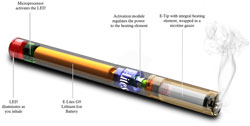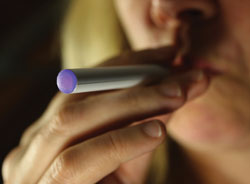A recent rise in the use of electronic cigarettes among teenagers is attracting national attention based on the effectiveness and potential dangers.
The percentage of middle and high school students who have used electronic cigarettes has more than doubled from 2011 to 2012, according to a report from the Centers for Disease Control and Prevention (CDC) issued on Sept. 5. The report also states that in 2012, 1.78 million students tried electronic cigarettes.
Suanne Schaad, University substance abuse counselor said that since e-cigarettes were first introduced in 2008, they have doubled in appeal every year since.
Electronic cigarettes are battery-operated devices shaped like cigarettes that are marketed to simulate the act of smoking without the harmful side effects of traditional cigarettes. Instead of smoke, an electronic cigarette user exhales an odorless vapor formed from inhaling the ingredients inside the device through its battery-powered filter.
Schaad feels that e-cigarettes may be beneficial to those who wish to quit smoking. “It could be used as a step down method,” said Schaad. “The only issue is not knowing the exact amount of nicotine that is being delivered.”
Little is known about the long-term side effects of using electronic cigarettes, which leaves questions about their safety and effectiveness unanswered, as well as the possible risks of addiction.
Proponents of electronic cigarettes argue that because they lack the many toxins found in traditional cigarettes, electronic cigarettes serve as a safe alternative to smoking.
Dr. Franca Mancini, Director of Counseling and Psychological Services at the University is concerned that using electronic cigarettes can lead to a nicotine addiction. “Nicotine has an adverse effect on the body and can lead to a variety of physical and psychological problems, although, the producers of e-cigs say that the small amounts contained in their product present no long-term harmful effects.”
Schaad explained that while e-cigarettes may be beneficial for those quitting traditional cigarettes, “potential risks associated could be that people start with e-cigarettes and move to a regular cigarette.”
Schaad added, “There has been a lot of controversy as to whether it is marketed to young people, especially since there are some flavored e-cigarettes.”
Electronic cigarettes contain five ingredients; propylene glycol (PPG), glycerol, nicotine, water, and flavoring, according to The Tobacco Vapor Electronic Cigarette Association (TVECA), an advocacy group for electronic cigarettes.
Mancini explained that the reasoning that teens find e-cigarettes attractive because “younger people are very susceptible to addiction since the element of peer pressure is so strong at this developmental stage.”
Mancini did note that the University has not encountered any issues on campus regarding the e-cigarettes, although “smoking in general on college campuses is a huge issue, although students rarely see it as a problem.”
Although PPG may be best known as a common additive in antifreeze, which is unsafe for human consumption, the TVECA stated on their website that “PPG has been in the U.S. food supply since the 1930’s,” including some brands of frozen yogurt, ice cream bars and citrus flavorings.
A report from ABC News last week stated a recent Food and Drug Administration (FDA) study that found nine possible contaminants in an unnamed brand of electronic cigarettes, while traditional cigarettes have nearly 11,000 known contaminants. The potential side effects of the contaminants are not known at the moment.
Schaad said that as a result to the remaining side effects found in the e-cigarettes the FDA is being urged to put a ban on them by the Attorney General’s Office.
 Dr. Sheila McAllister, Associate Professor of Public Relations, believes more research and regulations on electronic cigarettes are necessary to fully understand their effects. “There’s not enough info out there. These kids who are [using them] are basically part of a larger experiment of whether these cigarettes have long-term health effects, and we might not know until they turn 40 or 50 years old.”
Dr. Sheila McAllister, Associate Professor of Public Relations, believes more research and regulations on electronic cigarettes are necessary to fully understand their effects. “There’s not enough info out there. These kids who are [using them] are basically part of a larger experiment of whether these cigarettes have long-term health effects, and we might not know until they turn 40 or 50 years old.”
McAllister, a mother of two college-aged twins, is a former smoker and understands the rationale of the younger generation using electronic cigarettes. “If they were around when I smoked in high school and college, I think I might have bought the line that they are safe and don’t cause cancer. Maybe that explains why they are buying them. I would think I could still be cool, but I’m not going to get cancer. And they don’t leave that smell of smoke that their parents can pick up on.”
University students, smokers, non-smokers, and former smokers alike, seem to echo the concerns about becoming addicted to a device of which the long-term health effects of are still unknown.
“Electronic cigarettes could be even worse than regular cigarettes, because then you don’t know how much nicotine you are inhaling,” freshman music major, Matt Jordan, a smoker himself, said. “When a cigarette is done, it’s done. But an electronic cigarette could be dangerous for kids to smoke because they probably don’t count the puffs. You can use e-cigarettes until the battery runs out, and that lasts for a long time”
Jordan said he hasn’t used electronic cigarettes and he wouldn’t consider smoking them instead of a regular cigarette. “It’s especially worse if you don’t smoke first, because then it’s just a habit for the sake of a bad habit. We all know nicotine is terrible for you. But at least an adult who makes the choice to smoke does it knowing the full effects. We don’t know everything about electronic ones.”
A junior advanced chemistry major and daily e-cigarette user, who wishes to remain anonymous feels that the e-cigarettes still give her the enjoyment of smoking something, while slowly weaning herself off of nicotine addiction. “…You can definitely tell that there is less nicotine present because each inhale is not as strong.”
Diane McQuay, office coordinator in Communication Department also uses the e-cigarettes daily for health reasons, although she occasionally does smokes cigarettes. “Even though it’s vapor, when you feel the drag you know it’s water, it’s wet.”
Senior Nick Dolphin, a former smoker, doesn’t believe electronic cigarettes are an effective tool to help a smoker quit smoking. “The best way to quit is cold turkey and just cut all the nicotine off,”
“As a former smoker, I can say that it’s not a good habit. We don’t know about the negative effects electronic cigarettes could have on someone yet because they are so new.”
PHOTO TAKEN from wordpress.com
PHOTO TAKEN from organiccommonsense.com


